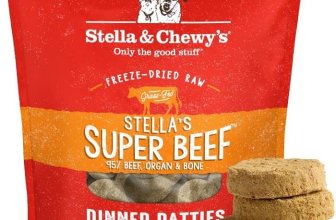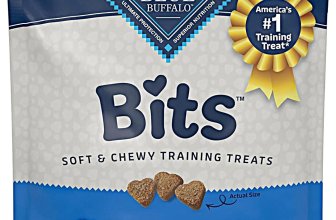5 Best Dog Foods for Skin Allergies Recommended by Vet-

Best Dog Foods for Skin Allergies Recommended by Veterinarians
Imagine your dog constantly scratching, licking, or chewing their skin to the point of irritation or even infection. It’s not only distressing for your beloved pet but also heartbreaking for you as a dog owner.This comprehensive guide will help you discover the best dog foods for skin allergies. Skin allergies are one of the most common and frustrating health issues faced by dogs, often caused or worsened by food sensitivities. What if you could significantly reduce your dog’s discomfort just by making the right choice in their diet?
This guide will help you discover the topic. That are not only vet-recommended but also backed by science and real-world success. From understanding the root causes of skin allergies to identifying the most effective ingredients and vet-approved brands, this article is your one-stop resource. Whether your dog is battling itchy skin, hair loss, or chronic infections, the right food can make all the difference in their health and happiness.
Understanding Skin Allergies in Dogs
Dogs develop skin allergies due to environmental factors, flea bites, or, commonly, food sensitivities. Identifying and eliminating food allergens is crucial.
Common Symptoms:
- Itchy skin
- Red, inflamed patches
- Chronic ear infections
- Hair loss
- Gastrointestinal issues
Key Ingredients to Look For
1. Hydrolyzed Protein
Hydrolyzed proteins are proteins that have been chemically or enzymatically broken down into their basic amino acid components. This process reduces the size of the protein molecules, making them less likely to be recognized by the dog’s immune system as allergens. Because allergic reactions are triggered by immune responses to specific protein structures, hydrolyzed proteins are an excellent choice for dogs with food sensitivities. These proteins also promote easy digestion and are commonly used in prescription allergy diets.
2. Limited Ingredient Diets (LID)
Limited Ingredient Diets focus on simplicity and transparency. They typically feature a single protein source and a single carbohydrate source, along with minimal additives. The goal is to reduce the number of potential allergens your dog is exposed to, making it easier to identify which ingredient might be causing a reaction. These diets often exclude common allergens such as beef, chicken, dairy, wheat, and soy, instead opting for less commonly used ingredients.
3. Omega-3 and Omega-6 Fatty Acids
These essential fatty acids play a critical role in maintaining healthy skin and a shiny coat. Omega-3 fatty acids, particularly EPA (eicosapentaenoic acid) and DHA (docosahexaenoic acid), have powerful anti-inflammatory properties that help reduce redness, itching, and swelling associated with skin allergies. Omega-6 fatty acids, like linoleic acid, help maintain the skin’s moisture barrier, preventing dryness and flakiness. These nutrients are commonly sourced from fish oil, flaxseed, and certain plant oils.
4. Novel Proteins
Novel proteins are animal protein sources that your dog has not been previously exposed to, such as venison, duck, rabbit, or kangaroo. Because allergies develop over time with repeated exposure to specific proteins, using a novel protein can help prevent or alleviate allergic reactions. These proteins are particularly useful in elimination diets, where the goal is to avoid known allergens and reintroduce foods gradually to identify triggers.
Things To Consider When Buying Dog Food for Allergies
Selecting the best dog food for skin allergies involves more than just choosing a product labeled “hypoallergenic.” Here are crucial factors to consider:
1. Identify Known Allergens
Work with your veterinarian to determine if your dog is allergic to common ingredients like beef, chicken, dairy, soy, or wheat. Avoid foods containing these allergens.
2. Choose the Right Protein Source
Opt for hydrolyzed or novel proteins to reduce allergic reactions. Consider rotating protein sources occasionally to avoid the development of new sensitivities.
3. Evaluate Ingredient Transparency
Look for foods with clear labeling and minimal ingredients. Avoid artificial additives, preservatives, and fillers.
4. Nutritional Balance
Ensure the food provides complete and balanced nutrition, including essential vitamins, minerals, and fatty acids to support overall health.
5. Brand Reputation and Veterinary Endorsement
Select brands with a solid reputation for quality and safety. Products recommended or formulated by veterinarians are typically more reliable.
6. Monitor Your Dog’s Response
Observe any changes in your dog’s symptoms, coat condition, and overall health after switching foods. Adjust based on results and consult your vet as needed.
Top Veterinarian-Recommended Dog Foods for Skin Allergies
1. Hill’s Prescription Diet z/d
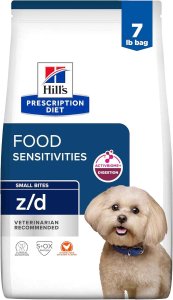
Hill’s Prescription Diet z/d from amazon
- Type: Hydrolyzed protein
- Benefits: Reduces skin and food sensitivities, improves coat health
- Veterinarian Note: Ideal for elimination trials
- Review and Rating’s: ★★★★½ 4.6 out of 5 stars (1,735 ratings) on amazon
- Check offer: amazon limited stock-
2. Royal Canin Ultamino
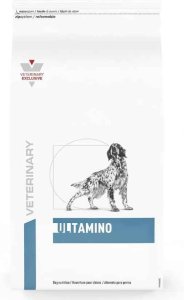 Best Dog Foods for Skin Allergies. picture from- amazon
Best Dog Foods for Skin Allergies. picture from- amazon- Type: Hydrolyzed protein
- Benefits: Supports skin health, highly digestible, reduces inflammation
- Veterinarian Note: Excellent for chronic allergy sufferers
- Check offer: click on –amazon limited stock
3. Natural Balance LID Sweet Potato & Fish
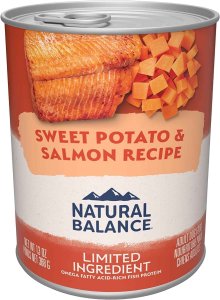
Natural Balance Sweet Potato Formula
- Type: Limited Ingredient Diet
- Benefits: Rich in Omega fatty acids, novel protein source
- Veterinarian Note: Good for mild to moderate allergies
- Rating and Review: ★★★★✩ (3.6/5) on amazon
- Check offer: amazon
4. Blue Buffalo Basics Skin & Stomach Care
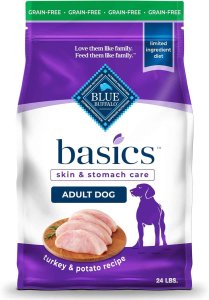
Blue Buffalo Basics Skin & Stomach Care
- Type: LID with novel protein
- Benefits: No chicken or beef, contains pumpkin and brown rice
- Veterinarian Note: Affordable and effective
- Rating and Review: ★★★★½ 4.7 out of 5 stars (1,991 ratings) on amazon
- Check offer: amazon
5. Purina Pro Plan Veterinary Diets HA
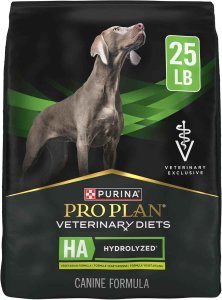
Purina Pro Plan Veterinary Diets HA pack of lb-25
- Type: Hydrolyzed diet
- Benefits: Excellent digestibility, complete nutrition
- Veterinarian Note: Ideal for both skin and gastrointestinal allergies
- Rating and Review: ★★★★☆ 4.2 out of 5 stars (127 ratings)
- Check offer: amazon
Diagnostic Approach for Food Allergies
Step 1: Veterinarian Consultation
Confirm skin allergies through examination and testing.
Step 2: Elimination Diet Trial
Use hydrolyzed or novel protein diets exclusively for 8-12 weeks.
Step 3: Reintroduction Phase
Gradually reintroduce old foods to identify specific allergens.
Object and Their Relationships
|
|
|
|---|---|---|
| Dog | Animal | Skin Allergy, Diet, Veterinarian, Protein |
| Skin Allergy | Condition | Dog, Itchiness, Inflammation, Food Allergy |
| Hydrolyzed Protein | Ingredient | Dog Food, Allergy Reduction, Digestibility |
| Veterinarian | Professional | Diagnosis, Treatment, Prescription Diet |
| Omega Fatty Acids | Nutrient | Skin Health, Anti-Inflammatory, Diet |
| Royal Canin | Brand | Ultamino, Dog Food, Allergy Treatment |
| Hill’s Prescription Diet | Brand | z/d Formula, Dog Food, Elimination Diet |
| Food Allergy | Condition | Dog, Skin Allergy, Diet, Novel Protein |
| Limited Ingredient Diet | Diet Type | Allergy Control, Dog Food, Novel Ingredients |
| Novel Protein | Ingredient | Duck, Venison, Kangaroo, Allergy Management |
Enhancing Skin Health Naturally
Supplement your dog’s diet with:
- Fish Oil Supplements: Rich in EPA and DHA for anti-inflammatory benefits.
- Probiotics: Improve gut health and reduce allergic responses.
- Regular Bathing: With hypoallergenic shampoos to soothe the skin.
Conclusion
Skin allergies in dogs are more than just a minor inconvenience—they can significantly affect your pet’s quality of life. Persistent itching, infections, and discomfort are often signs that your dog’s immune system is reacting to something in their environment or, more commonly, their food. Addressing these issues with the right diet is not only a practical solution but also a preventive strategy that can enhance your dog’s overall well-being.
Selecting the right dog food for skin allergies means understanding your dog’s unique sensitivities, working with your veterinarian, and choosing formulations specifically designed to minimize allergens and support skin health. Whether through hydrolyzed proteins, limited ingredients, or novel proteins, there are effective dietary options available to help your dog live a comfortable, itch-free life. Use this guide to make informed decisions and take proactive steps in managing your dog’s skin health.
FAQs
Q1: What are the most common food allergens for dogs with skin allergies?
A1: Common food allergens include beef, chicken, dairy, wheat, soy, and eggs. Identifying and eliminating these from your dog’s diet can help reduce allergy symptoms.
Q2: How long does it take to see improvements after switching dog food?
A2: Typically, you should see improvements within 8-12 weeks. However, this may vary depending on the severity of the allergy and the effectiveness of the new diet.
Q3: Is a prescription diet necessary for all dogs with skin allergies?
A3: Not always. Some dogs benefit from over-the-counter limited ingredient diets, but severe cases may require a veterinarian-prescribed hydrolyzed protein diet.
Q4: Can supplements help with my dog’s skin allergies?
A4: Yes, supplements like fish oil (Omega-3) and probiotics can support skin health and reduce inflammation when used alongside a proper diet.
Q5: Are grain-free diets better for dogs with skin allergies?
A5: Not necessarily. Some dogs may benefit, but grain-free is not inherently hypoallergenic. Focus on individual sensitivities and consult your vet.
Read More
- About grain free dog food: click here
- About dry dog food: click here



